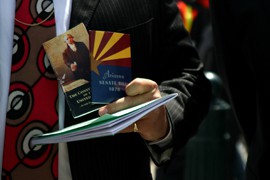Cronkite News has moved to a new home at cronkitenews.azpbs.org. Use this site to search archives from 2011 to May 2015. You can search the new site for current stories.
Arizona’s feuding with feds is as old as the state – but sharper than ever
WASHINGTON – Lots of states feud with the federal government. But Arizona has become something of a poster child of late.
Gov. Jan Brewer’s finger-wagging tarmac confrontation with President Barack Obama made national news in January. Her subsequent nomination to a Time magazine online poll of the 100 most influential people in the world was evidence, the magazine said, that “Arizona has faced off with the federal government like no other state in recent memory” under her leadership.
The state was in the Supreme Court last week defending itself against a Justice Department lawsuit over Arizona’s SB 1070 immigration law – just a year after it won another Supreme Court case the feds had filed over the state’s E-verify employer sanctions law.
Arizona Attorney General Tom Horne – who said earlier this year that his office is enmeshed in eight lawsuits with the federal government – is vowing to press another case to the high court, after a circuit court rejected part of the state’s voter registration law this month.
And state lawmakers just passed a bill demanding that the federal government hand back the millions of acres it owns in Arizona, while a Phoenix businessman is pushing a ballot initiative that would let voters flat-out reject any federal law they disagree with.
“We are commonly known as being very Western strong,” Brewer told Cronkite News in January. “We have always been kind of a leader in states’ rights. We have been affected immensely by some of the (federal) policies and we just can’t sit back and let that happen to Arizona.”
Still, other governors tell off the president. Other states have threatened to take back their federal lands. Arizona’s not even the leader in litigation against the feds: Attorneys general from Texas and Florida said this spring they are handling about a dozen and at least 10 lawsuits, respectively, against Washington.
But no other state gets the same notoriety as Arizona.
“The reason these ideas take root in Arizona more than other places is because Arizona really is the last vestige of the American spirit that bristles at the notion of federal bureaucrats running everything from Washington, D.C.,” said Nick Dranias, director of the Center for Constitutional Government at the Goldwater Institute in Phoenix.
And longtime political observers from both sides of the aisle agree that while the feuding is not unusual, the current level of anger is.
“In my lifetime, (Arizona) government officials are taking the most extreme positions I have ever seen,” said former state Attorney General Grant Woods, a Republican and one-time chief of staff to Sen. John McCain, R-Ariz. “SB 1070 and a few other things have gone too far.”
“Cemented in Arizona’s culture”
Fights between Arizona and the federal government trace back long before illegal immigration and border security became the top combustible political issues. They trace back, even, to before Arizona was a state.
The territory of Arizona was initially denied statehood when President William Howard Taft vetoed its proposed constitution over a provision that would have let Arizonans recall judges. The territory struck the provision, reapplied and, with Taft’s blessing, Arizona became a state on Feb. 14, 1912.
Later that year, Arizonans put the authority to recall judges back in the state constitution.
“This is your first example of Arizona fighting back against federal overreach,” said Christina Sandefur, a staff attorney also with the Goldwater Institute. “It’s something that is cemented in Arizona’s culture.
“From the very beginning, Arizona has been very, very protective of the rights of states, and really the rights to go its own way,” Sandefur said.
Arizona’s anti-establishment tradition is not unique among states in the interior West. The region has a long, entrenched history of antagonism toward Washington, said Gregg Cawley, a political science professor at the University of Wyoming.
“You’d be hard pressed to find anyone in the Mountain West who hasn’t had some expression of animosity toward the federal government,” Cawley said.
Much of that animosity stems from disputes over federal land management, said Cawley. His book “Federal Land, Western Anger” explores the Sagebrush Rebellion of the 1970s and 1980s, in which a coalition of Western states demanded the federal government give state and local authorities more control of Western lands.
“The basic problem is the amount of federal land that is located out here, which gives the federal government more of a presence,” Cawley said. “The perception of a lot of Western states is that autonomy … is constantly in jeopardy.”
In most states, the federal government typically owns less than 5 percent of the land. In Western states, that number is closer to 40 or 50 percent.
In Arizona, a state of almost 73 million acres, federal agencies own about 44 percent of the land, said Joseph Feller, a natural resources and property law professor at Arizona State University. Another 27 percent is allocated to Indian reservations.
Only about 14 percent is private or municipally owned and the remaining 15 percent – just 11 million acres – is owned by the state.
Most suggest that Arizona’s culture of independence is also a basic characteristic of the people who settled there – and who continue to do so today.
“If you can imagine what type of person moved out here in the late 1800s or early 1900s, when it’s 120 degrees and no air conditioning, you had to have a hearty soul, and didn’t care about what was going on back in Washington,” Woods said.
“Just as other states have certain themes running throughout its history, Arizona has always had an anti-establishment mentality and we continue to attract those same kind of people,” he said.
An anti-Washington “perfect storm”
But the state’s historic anti-establishment animosity has hardened in recent years, most observers say.
To some, mostly Democrats, Arizona’s recent clashes with Washington are the result of years of political, economic and cultural changes at the national and state levels.
Republicans gained strength in the state legislature. Democratic Gov. Janet Napolitano left to take over the Department of Homeland Security in 2009, handing the seat to Brewer, a Republican. With Brewer’s decision to stake her re-election on being tough on immigration, conservatives were able to push through bills such as SB 1070, said Randy Parraz, a Democrat who unsuccessfully ran for U.S. Senate in 2010.
“It was a perfect storm for them to appeal to the xenophobic, anti-Latino sentiment,” Parraz said. “When did the federal government become the enemy?”
Others reject the notion that bills like SB 1070 are only matter of partisan politics.
“People in general are feeling the need to draw the line with greater passion because there’s so little left to defend from federal overreach,” said Dranias of the Goldwater Institute. “The federal government is reaching out and literally trying to take away the last vestiges of authority states have.
“We’re fortunate to be in a state where people aren’t going to stand for that,” he said.
But the federal government hasn’t always been “the enemy,” as Parraz says. There have been moments in Arizona’s 100-year history of “tremendous cooperation” with Washington that are usually to the state’s benefit, said former state Attorney General Terry Goddard.
Past cooperation led to the creation of partnerships such as the Salt River Project, began in 1903, and the Central Arizona Project, began in 1968, said Goddard, a Democrat.
“Those would not have happened without major federal leadership and cooperation with state authorities,” Goddard said in March. “Ninety percent of the time we got a lot more with sugar than an attack.”
But Horne sees it differently. He believes Arizona is targeted by the Obama administration for lawsuits because the state is under the jurisdiction of the 9th U.S. Circuit Court of Appeals, which he called the “most liberal circuit in the country.”
Horne said the federal government is out of touch with Arizona, and that many Washington policymakers are entrenched in age-old perceptions of the state.
“They live with the kind of East Coast myth about people in Arizona being against Latinos, being against immigrants,” Horne said in March. “None of that is true. We’re only against illegal immigration.”
Regardless of who’s to blame for the strained relationship, observers agree it is not likely to change anytime soon.
“Where does it end? I don’t know,” said Woods, the former Republican attorney general. “You think we have every possible gun law in place and then they come up with another one. You think they’ve passed every possible abortion law and they come up with another one.”








